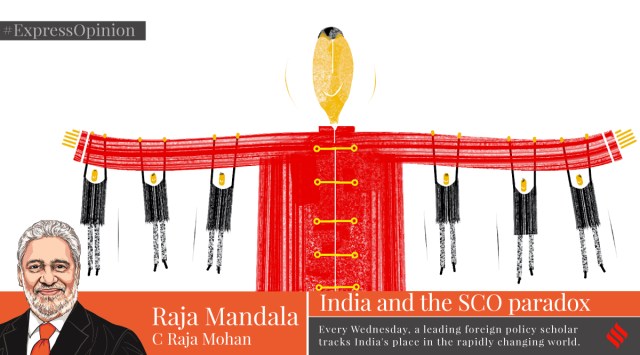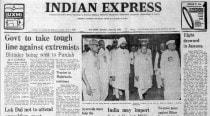C Raja Mohan writes: SCO meet highlights China’s growing role in inner Asia, India’s challenge
C Raja Mohan writes: Delhi’s engagement with the SCO all these decades was premised on Russian primacy in the region and Moscow’s support of India’s regional interests. That may be changing
 C Raja Mohan writes: If the main objective of the SCO was to promote peace in Eurasia, its ability to cope with the intra-state and inter-state conflicts among the member states is now under scrutiny (File)
C Raja Mohan writes: If the main objective of the SCO was to promote peace in Eurasia, its ability to cope with the intra-state and inter-state conflicts among the member states is now under scrutiny (File) The visit of Chinese and Russian defence ministers to attend a ministerial meeting of the Shanghai Cooperation Organisation this week in Delhi is drawing much attention. India, which is chairing the Eurasian regional forum this year, will have a range of bilateral problems to discuss with its fellow SCO members. These include the disengagement and de-escalation of the border confrontation with China and Moscow’s supply of spares to the large inventory of Russian arms amidst the war in Ukraine.
But what about the broader geopolitical evolution of the SCO that Beijing and Moscow jointly founded and nurtured over the last three decades? That takes us to the SCO paradox: Even as the Eurasian forum looks attractive to a growing number of regional states, its internal contradictions are casting a shadow over its strategic coherence.
If the main objective of the SCO was to promote peace in Eurasia, its ability to cope with the intra-state and inter-state conflicts among the member states is now under scrutiny. To make matters more complicated, Russia’s war in Ukraine is raising questions about Moscow’s capacity to sustain primacy in its backyard. Meanwhile, China’s rise is increasing the prospects for Beijing’s emergence as the dominant force in inner Asia.
If clamour for membership is a measure of a forum’s success, the SCO is doing well. Zhou Bo, retired senior colonel of the People’s Liberation Army and a regular commentator on regional strategic affairs, was making an interesting comparison the other day between the long lines for membership at the doors of the North Atlantic Treaty Organisation and the SCO.
Many countries in Central Europe, including Ukraine, want to follow Finland and Sweden into NATO. Several important regional states in India’s neighbourhood are queuing up to join the SCO, which now has eight members – China, India, Kazakhstan, Kyrgyzstan, Pakistan, Russia, Uzbekistan, and Tajikistan.
Iran is set to join the SCO and Afghanistan, Belarus, and Mongolia are observers and would like to follow Tehran. Then there is the impressive list of current and incipient dialogue partners that includes Azerbaijan, Armenia, Egypt, Qatar, Turkey, Saudi Arabia, and the United Arab Emirates from the Middle East and Maldives, Nepal, and Sri Lanka from the Subcontinent.
Unlike NATO, Zhou Bo argues, the SCO is inclusive, and its attractiveness underlines the rise of non-Western security institutions. That Turkey, a long-standing member of NATO, wants to be part of SCO certainly highlights the value of being part of a forum led by Russia and China that today are at loggerheads with the West.
Writing in the South China Morning Post earlier this month, Zhou Bo does not gloss over the internal conflicts in the SCO by pointing to the serious conflicts between India and China, Delhi and Islamabad, as well as Kyrgyzstan and Tajikistan. We could add the deepening tensions between the Taliban-led Afghanistan and Pakistan to the list.
Zhou Bo reminds us that counter-terrorism has been the principal preoccupation of the SCO all these years. This is not surprising given the urgent need to cope with the dramatic rise of violent religious extremism in the closing years of the 20th century and its spectacular manifestation at the dawn of the 21st in the form of the 9/11 attacks on New York and Washington.
Preventing conflict within and between the member states and associates is now becoming a higher priority for the SCO, says Zhou. But the forum’s record here is not impressive. Consider, for example, Afghanistan whose internal instabilities have been a major driver for the SCO. For all the talk of the SCO becoming the regional security arbiter, it was a direct deal between the US and the Taliban that reshaped the Afghan dynamic.
In January 2022, when there was a major internal upheaval in Kazakhstan it was not the SCO that rode to the rescue; it was the Russian army that intervened to stabilise the situation. But Russia’s war against Ukraine a few weeks later has sent a shiver down the spine of former Russian republics.
If Russia is a protector of the Central Asian regimes, it could also be a potential predator. Russian leaders have often dismissed Central Asian states as artificial nations. President Vladimir Putin’s vision of a “Russkiy Mir” – or the Russian world – underlines Moscow’s special responsibility to protect Russian minorities beyond its formal borders. Unsurprisingly, no Central Asian neighbour has endorsed the Russian invasion of Ukraine.
To be sure, Russia is deeply entrenched within the Central Asian state system with strong ties to local elites and security establishments. Many Central Asians work in Russia and send valuable remittances home. Yet after Ukraine, the Central Asian states are looking to intensify their diversification strategies to reduce their reliance on Russia.
Akin to India’s “multi-alignment”, Kazakhs for example, talk about “multi-vector diplomacy”. Not every one of the Central Asian states is able to pursue this strategy as vigorously as Kazakhstan. Meanwhile, there is no shortage of regional actors seeking to expand their influence in Russia’s backyard. Turkey and Iran are two prime examples. But it is the Central Asian role of a rising China that should draw the attention of the Indian strategic community.
Some observers argue that China’s growing regional influence will come at Russia’s expense, as Beijing becomes the senior partner in the bilateral relationship with Moscow after Ukraine. Others point to the fact that Russia and China have drawn closer than ever before and that they have little reason to quarrel over Central Asia. Moscow’s muscle and Beijing’s money provide a sensible basis for their strategic division of labour in Central Asia to keep the Western powers out of the region.
A third argument agrees that China has no reason to replace Moscow as the main power in Central Asia in the near term, but it warns against underestimating Beijing’s long-term ambitions in the region. One straw in the wind is Beijing’s explicit support of the sovereignty of the Central Asian states.
On his way to the SCO summit at Samarkand last September, Chinese President Xi Jinping stopped over in Kazakhstan. “No matter how the international situation changes, we will continue to resolutely support Kazakhstan in protecting its independence, sovereignty and territorial integrity,” Xi said during a meeting with Kazakh President Kassym-Jomart Tokayev.
Shared borders, growing political salience, and rising regional security profile promise to make China a force to reckon with in Central Asia in the not-too-distant future. Prepare to hear from Chinese defence minister General Li Shangfu on Beijing’s ‘Global Security Initiative’ this week. It will be tempting to dismiss the GSI as a grab bag of cliches. But it is part of the Chinese effort to construct a new narrative that will reinforce Beijing’s regional security objectives.
Delhi’s engagement with the SCO all these decades was premised on Russian primacy in the region and Moscow’s support of India’s regional interests. For India, a strong and independent Russia is critical for maintaining the inner Asian balance. But Delhi is in no position to ensure Moscow’s strategic autonomy from Beijing; that depends on Russian strategic choices. Delhi’s burden in SCO must now be to protect its own interests amidst a rapidly changing regional power distribution in China’s favour. That India does not have direct geographic access to the landlocked region makes that challenge a demanding one.
The writer is senior fellow, Asia Society Policy Institute, Delhi and contributing editor on international affairs for The Indian Express








































